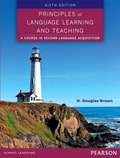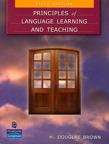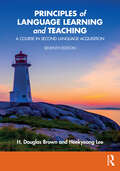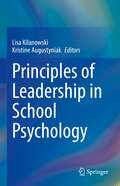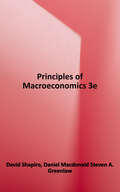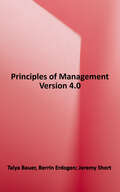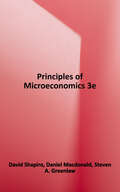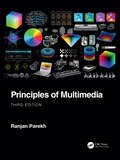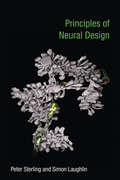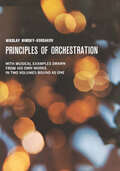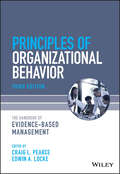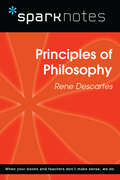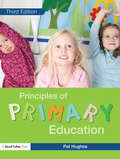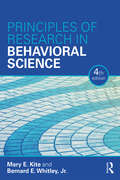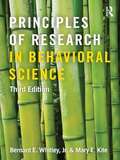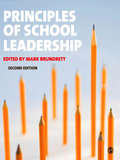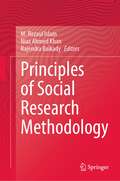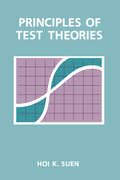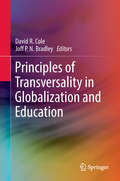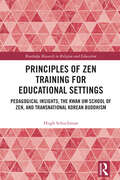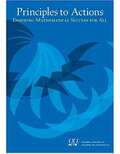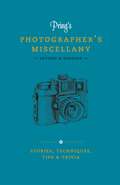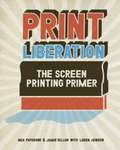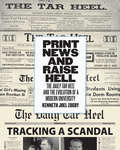- Table View
- List View
Principles of Language Learning and Teaching
by H. Douglas BrownThe sixth edition of Principles of Language Learning and Teaching offers new ways of viewing and teaching second language acquisition (SLA) based on the latest research. Providing a comprehensive overview of the theoretical viewpoints that have shaped language teaching today, the text explains the pedagogical relevance of SLA research in reader-friendly prose. <P><P> The new edition of this classic text, used by teacher-education programs worldwide, reflects the most recent themes in SLA research, updated references, and a summation of current issues and perspectives. The text is available in print and eText formats.
Principles of Language Learning and Teaching (Fifth Edition)
by H. Douglas BrownPrinciples of Language Learning and Teaching, Fifth Edition, by H. Douglas Brown, is the classic second language acquisition text used by teacher education programs worldwide. Principles introduces key concepts through definitions of terms, thought-provoking questions, charts, and spiraling. New Classroom Connections encourage students to consider the implications of research for classroom pedagogy. An up-to-date bibliography and new glossary provide quick access to important works and key terminology in the field. The fifth edition takes a comprehensive look at foundations of language teaching through discussions of the latest research in the field, including: * Vygotsky's and Bakhtin's theories * Thorndike's law of effect * error treatment, noticing, recasts * intercultural communication * language policy and politics * corpus linguistics *hot topics in SLA * connectionism and emergentism * flow theory, willingness to communicate * strategies-based instruction * contrastive rhetoric * attribution theory, self-efficacy * output hypothesis Also by H. Douglas Brown: Teaching by Principles: An Interactive Approach to Language Pedagogy Language Assessment: Principles and Classroom Practices Strategies for Success: A Practical Guide to Learning English
Principles of Language Learning and Teaching: A Course in Second Language Acquisition
by H. Douglas Brown Heekyeong LeeThe seventh edition of this classic second language acquisition (SLA) text provides an overview of the theoretical foundations of language teaching. This new edition has been updated to capture current research and practice in the field. Among concepts that are either redefined or entirely new are: Language learning in an era of globalization and multilingualism The significance of transnationalism, identity, investment, agency, and ideology Language learning as situated, usage-based, and socioculturally contextualized The importance of emotional engagement, intercultural sensitivity, and self-efficacy in language learning Transdisciplinary and ecological approaches as keys to language teaching in the 21st century The seventh edition also retains useful historical information and foundational cornerstones of SLA that teachers have found beneficial in their instruction. Key principles continue to be presented and explained with direct application to classroom language education and real-life contexts. Features such as "Points to Ponder" (questions for readers’ personal reflection), classroom connections and "Tips for Teaching," suggested readings, and a glossary of terminology are updated in this edition. With its reader-friendly style, practical pedagogical tools, and comprehensive coverage of state-of-the-art research findings, this edition serves as an essential resource for language teacher education programs worldwide, catering to the needs of both novice and experienced language teachers.
Principles of Leadership in School Psychology
by Lisa Kilanowski Kristine AugustyniakThis book provides a long overdue conceptual framework for integrating evidence-based principles of school psychology leadership across NASP (National Association of School Psychologists) domains of practice. It explicates the myriad ways in which school psychologists can and should serve as leaders across the NASP domains, examines the leadership role of school psychologists within each NASP domain, and presents both historical and contemporary contexts of the domains of practice. Key areas of coverage include:Concrete examples of school psychologists as leaders in the field.Spearheading initiatives and service delivery models involving consultation and collaboration.Academic intervention planning.Behavioral and mental health services.Crisis intervention and prevention.Consultation, program evaluation, and ethics of professional practice.The book offers a cogent framework for practitioners and trainers of school psychologists to further integrate principles of leadership into their work in the field. The volume culminates with a discussion of the role of school psychologists as advocates for the practice through legislative and social justice policy.Principles of Leadership in School Psychology is an essential resource for researchers, professors, and graduate students as well as professionals in school and clinical child psychology, educational policy and practice, and social work as well as all interrelated disciplines.
Principles of Macroeconomics, 3e
by David Shapiro Daniel Macdonald Steven A. GreenlawPrinciples of Macroeconomics 3e covers the scope and sequence of most one-semester introductory macroeconomics courses. The third edition takes a balanced approach to the theory and application of macroeconomic concepts. The text uses conversational language and ample illustrations to explore economic theories and provides a wide array of examples using both fictional and real-world scenarios. The third edition has been carefully and thoroughly updated to reflect current data and understanding, as well as to provide a deeper background on diverse contributors and their impacts on economic thought and analysis. For example, the third edition highlights the research and views of a broader group of economists. Brief references and deeply explored socio-political examples have also been updated to showcase the critical – and sometimes unnoticed – ties between economic developments and topics relevant to students.
Principles of Management Version 4.0
by Talya Bauer Jeremy Short Berrin ErdogenPrinciples of Management covers all of the traditional topics in an introductory management course. The authors teach management principles to tomorrow's business leaders by weaving three threads through every chapter: strategy, entrepreneurship, and leadership. It is a concise, accessible, and engaging text that communicates the latest findings and best practices related to mastering the principles of management.
Principles of Microeconomics, 3e
by David Shapiro Daniel Macdonald Steven A. GreenlawPrinciples of Microeconomics 3e covers the scope and sequence of most one-semester introductory microeconomics courses. The third edition takes a balanced approach to the theory and application of microeconomics concepts. The text uses conversational language and ample illustrations to explore economic theories and provides a wide array of examples using both fictional and real-world applications. The third edition has been carefully and thoroughly updated to reflect recent developments, as well as to provide a deeper background in diverse contributors and their impacts on economic thought and analysis. For example, the third edition highlights the research and views of a broader group of economists. This is the official print version of this OpenStax textbook. OpenStax makes full-color hardcover and B&W paperback print copies available for students who prefer a hardcopy textbook to go with the free digital version of this OpenStax title. The textbook content is exactly the same as the OpenStax digital book. This textbook is available for free download at the OpenStax dot org website, but as many students prefer to study with hardcopy books, we offer affordable OpenStax textbooks for sale through Amazon as well as most campus bookstores.
Principles of Multimedia
by Ranjan ParekhPrinciples of Multimedia introduces and explains the theoretical concepts related to the representation, storage, compression, transmission and processing of various multimedia components, including text, image, graphics, audio, video and animation, as well as their use across various applications. The book provides the necessary programming tools and analysis technique concepts to perform practical processing tasks in software labs and to solve numerical problems at the postgraduate level. For this new third edition, every chapter has been updated and the book has been carefully streamlined throughout.Chapter 1 provides an overview of multimedia technology, including the definition, major characteristics, hardware, software, standards, technologies and relevant theorems with mathematical formulations. Chapter 2 covers text, including digital text representations, text editing and processing tools, text application areas and text file formats. Chapter 3 explores digital image input and output systems, image editing and processing tools, image application areas, image color management and image file formats. Chapter 4 discusses 2D and 3D graphics algorithms, transformation matrices, splines, fractals, vectors, projection application areas and graphics file formats. Chapter 5 covers audio, including digital audio input and output systems, audio editing and processing tools, audio application areas and audio file formats. Chapter 6 looks at video, including digital video input and output systems, video editing and processing tools, video application areas and video file formats. Chapter 7 focuses on animation, covering 2D and 3D animation algorithms, interpolations, modeling, texture mapping, lights, illumination models, camera, rendering, application areas and animation file formats. Finally, Chapter 8 covers compression, including lossless and lossy compression techniques, and various algorithms related to text image audio and video compression. Every chapter includes solved numerical problems, coding examples and references for further reading.Including theoretical explanations, mathematical formulations, solved numerical problems and coding examples throughout, Principles of Multimedia is an ideal textbook for graduate and postgraduate students studying courses on image processing, speech and language processing, signal processing, video object detection and tracking, graphic design and modeling and related multimedia technologies.
Principles of Neural Design (The MIT Press Series)
by Peter Sterling Simon LaughlinTwo distinguished neuroscientists distil general principles from more than a century of scientific study, “reverse engineering” the brain to understand its design.
Principles of Orchestration
by Nikolai Rimsky-Korsakov"To orchestrate is to create, and this cannot be taught," wrote Nikolay Rimsky-Korsakov, the great Russian composer whose genius for brilliant, highly colored orchestration is unsurpassed. But invention, in all art, is closely allied to technique, and technique can be taught. This book, therefore, which differs from most other texts on the subject because of its tremendous wealth of musical examples and its systematic arrangement of material according to each constituent of the orchestra, will undoubtedly be of value to any music student. It is a music classic, perhaps the only book on classical orchestration written by a major composer.In it, the composer aims to provide the reader with the fundamental principles of modern orchestration from the standpoint of brilliance and imagination, and he devotes considerable space to the study of tonal resonance and orchestral combination. In his course, he demonstrates such things as how to produce a good-sounding chord of certain tone-quality, uniformly distributed; how to detach a melody from its harmonic setting; correct progression of parts; and other similar problems.The first chapter is a general review of orchestral groups, with an instrument-by-instrument breakdown and material on such technical questions as fingering, range, emission of sound, etc. There follows two chapters on melody and harmony in strings, winds, brasses, and combined groups. Chapter IV, Composition of the Orchestra, covers different ways of orchestrating the same music; effects that can be achieved with full tutti; tutti in winds, tutti pizzicato, soli in the strings, etc.; chords; progressions; and so on. The last two chapters deal with opera and include discussion of solo and choral accompaniment, instruments on stage or in the wings, technical terms, soloists (range, register, vocalization, vowels, etc.), voices in combination, and choral singing. Immediately following this text are some 330 pages of musical examples drawn from "Sheherazade," the "Antar Symphony," "Capriccio Espagnol," "Sadko," "Ivan the Terrible," "Le Coq d'Or," "Mlada," "The Tsar's Bride," and others of Rimsky-Korsakov's works. These excerpts are all referred to in the text itself, where they illustrate, far better than words, particular points of theory and actual musical practice. They are largely responsible for making this book the very special (and very useful) publication it is.This single-volume edition also includes a brief preface by the editor and extracts from Rimsky-Korsakov's 1891 draft and final versions of his own preface, as well as an appendixed chart of single tutti chords in the composer's works.
Principles of Organizational Behavior: The Handbook of Evidence-Based Management
by Edwin A. Locke Craig L. PearceExplore invaluable management advice informed by the latest in organizational and industrial behaviour research In the newly revised Third Edition of Handbook of Principles of Organizational Behavior: Indispensable Knowledge for Evidence-Based Management, world-renowned organizational behaviourists Edwin A. Locke and Craig L. Pearce deliver a comprehensive and authoritative discussion of sound management practices informed by the most recent evidence and research in organizational and industrial psychology. In the book, the authors present: Complimentary and downloadable video material linked to each chapter Executive interviews and author interviews, new cases, assessments, inventories and exercises Updated chapters written by world-leading experts on the covered topicsAn indispensable resource for students of human resources, organizational behaviour, industrial psychology, public administration and related subjects, Handbook of Principles of Organizational Behavior will assist students and professionals seeking the latest evidence-based management guidance.
Principles of Philosophy (SparkNotes Philosophy Guide)
by SparkNotesPrinciples of Philosophy (SparkNotes Philosophy Guide) Making the reading experience fun! SparkNotes Philosophy Guides are one-stop guides to the great works of philosophy–masterpieces that stand at the foundations of Western thought. Inside each Philosophy Guide you&’ll find insightful overviews of great philosophical works of the Western world.
Principles of Primary Education
by Pat HughesThis study guide has been revised to give practical guidance on the new standards for Qualified Teacher Status (QTS) and updated in line with the latest special needs Code of Practice and recent legislation. It is a firm base for student teachers on all types of initial teacher education courses - PGCE, BA (QTS), BEd and modular - and for those returning to primary teaching after a career break. It also serves as a 'refresher course' for experienced teachers, especially those transferring to primary teaching from other phases of education. Sufficiently rooted in practicalities to bridge the notorious theory/practice divide, the book is challenging and inspiring. Its friendly, supportive and interactive style enables the reader to take control of the learning process and there are planning sheets, pro formas and reminders to develop effective classroom practice. Each chapter provides its own learning objectives, followed by information, insights, activities and references to other sources of information and guidance. Overall, the Guide is an excellent starting point for those who wish to become good teachers of primary school children.
Principles of Research in Behavioral Science: Fourth Edition
by Bernard E. Whitley Jr. Mary E. KiteThis book provides a comprehensive overview of research methods in the behavioral sciences, focusing primarily on the conceptual issues inherent in conducting research. It covers topics that are often omitted from other texts, including measurement issues, correlational research, qualitative research, and integrative literature reviews. The book also includes discussions of diversity issues as they related to behavioral science research. New to this edition are chapter boxes that focus on applied issues related to each chapter topic. Throughout the book, readable examples and informative tables and figures are provided. The authors also take a contemporary approach to topics such as research ethics, replication research, and data collection (including internet research).
Principles of Research in Behavioral Science: Third Edition
by Bernard E. Whitley Jr. Mary E. KiteIntended for beginning graduate or advanced undergraduate students, this book provides a comprehensive review of research methods used in psychology and related disciplines. It covers topics that are often omitted in other texts including correlational and qualitative research and integrative literature reviews. Basic principles are reviewed for those who need a refresher. The focus is on conceptual issues - statistics are kept to a minimum. Featuring examples from all fields of psychology, the book addresses laboratory and field research. Chapters are written to be used independently, so instructors can pick and choose those that fit their course needs. Reorganized to parallel the steps of the research process, tips on writing reports are also provided. Each chapter features an outline, key terms, a summary, and questions and exercises that integrate chapter topics and put theory into practice. A glossary and an annotated list of readings are now included. Extensively updated throughout, the new edition features a new co-author, Mary Kite, and:* New chapters on qualitative research and content analysis and another on integrative literature reviews including meta-analysis, critical techniques for today's research environment. * A new chapter on exploratory and confirmatory factor analysis that addresses the use of path analysis and structural equation modeling. * A new chapter on how to write a research report using APA style.* Examples from cross-cultural and multi-cultural research, neuroscience, cognitive, and developmental psychology along with ones from social, industrial, and clinical psychology. * More on Internet research and studies.* Greatly expanded Part 3 on research designs with chapters on true experiments, field research, correlational and single-case designs, content analysis, and survey and qualitative research.* A website with PowerPoint slides for each chapter, a test bank with short answer and multiple choice questions, additional teaching resources, and the tables and figures from the book for Instructor's and chapter outlines, suggested readings, and links to related web sites for students. Intended as a text for beginning graduate and/or advanced undergraduate courses in research methods or experimental methods or design taught in psychology, human development, family studies, education, or other social and behavioral sciences, a prerequisite of undergraduate statistics and a beginning research methods course is assumed.
Principles of School Leadership
by Mark Brundrett′This book is an excellent resource for graduate students in educational leadership programmes. Clearly written chapters and sections are contributed by an array of internationally recognized senior scholars of educational leadership. Connections between leadership concepts and practices are presented clearly and thoroughly, with particular attention to the development of leaders′-Ken Brien, Ed.D., Associate Professor, University of New Brunswick ′This book skilfully integrates both theory and research with practical ideas and approaches around effective school leadership practice′-Graham Thomson, Director, Scottish Centre for Studies in School Administration, University of Edinburgh ′This book enables the reader to relate the theoretical underpinning of research to their own practice, present and future′-David Middlewood, Warwich University, Institute of Education This comprehensive book offers a unique mix of theory and practical guidance, showing you how to apply leadership techniques and approaches. This revised edition includes sections on: - key concepts in theory - the practice of educational leadership and management - developing educational leaders Focused and accessible, the book contains: - an overview and key learning aims at the start of each chapter - figures - discussion and summaries of key research issues Written by leading academics in the field, chapters cover key topics such as strategy, leading teaching and learning, leading and managing staff, deployment of resources, and working with the community. This book is essential reading for acting or aspiring school leaders on CPD programmes and Masters courses. Mark Brundrett is Co-Director of the Centre for Educational Research (CERS) at Liverpool John Moores University.
Principles of Social Research Methodology
by M. Rezaul Islam Rajendra Baikady Niaz Ahmed KhanThis book is a definitive, comprehensive understanding to social science research methodology. It covers both qualitative and quantitative approaches. The book covers the entire research process, beginning with the conception of the research problem to publication of findings. The text combines theory and practical application to familiarize the reader with the logic of research design, the logic and techniques of data analysis, and the fundamentals and implications of various data collection techniques. Organized in seven sections and easy to read chapters, the text emphasizes the importance of clearly defined research questions and well-constructed practical explanations and illustrations. A key contribution to the methodology literature, the book is an authoritative resource for policymakers, practitioners, graduate and advanced research students, and educators in all social science disciplines.
Principles of Test Theories
by Hoi K. SuenBased on a tremendous increase in the development of psychometric theories in the past decade -- ranging from techniques for criterion-referenced testing to behavioral assessment, generalizability, and item response theory -- this book offers a summary of core issues. In so doing, it provides a comprehensive survey of reliability, validity, and item analysis from the perspectives of classical true-score model, generalizability theory, item response theory, criterion-referenced testing, and behavioral assessment. Related theoretical issues such as item bias, equating, and cut-score determination are also discussed. This is an excellent text for courses in statistics, research methods, behavioral medicine and cognitive science as well as educational, school, experimental, counseling/social, clinical, developmental, and personality psychology.
Principles of Transversality in Globalization and Education
by David R. Cole Joff P.N. BradleyThis unique book comprehensively covers the evolving field of transversality, globalization and education, and presents creative, research-based thought experiments that seek to unravel the forces of globalization impacting education. Pursuing various approaches to and uses of transversality, with a focus on the ideas of Félix Guattari, it is the only book of its kind. Specifically, it examines the influence of Guattari at the forefront of educational research that addresses, enhances and sets free activist micro-perspectives, which can counter macro-global movements, such as capitalism and climate change. This book is a global education research text that includes perspectives from four continents, providing a balanced and significant work on globalization in education.
Principles of Zen Training for Educational Settings: Pedagogical Insights, the Kwan Um School of Zen, and Transnational Korean Buddhism (Routledge Research in Religion and Education)
by Hugh SchuckmanThis book provides insights into new developments and persistent traditions in Zen teacher training and education through the use of historical archival research and original interviews with living Zen Masters. It argues that some contemporary Euro-American social values of gender equality, non-discrimination, rationality, ecumenicism and democracy permeate not only the organizational aspects of the Kwan Um School of Zen case study, but soteriological processes and goals of the training more widely. Each chapter showcases the ways important facets of Zen education—from meditation to curriculum development to school management — have absorbed Euro-American cultural and social ideals in both community and educational practices. Giving dedicated scholarly attention and conceptualising new adaptations in transnational Zen communities, it constitutes an important and timely addition to the literature and will appeal to researchers and scholars of religion and education, Asian pedagogies, contemporary Buddhism, transnational Zen, and Zen education.
Principles to Actions: Ensuring Mathematical Success for All
by National Council of Teachers of MathematicsWhat it will take to turn the opportunity of the Common Core into reality in every classroom, school, and district. <p><p> Continuing its tradition of mathematics education leadership, NCTM has undertaken a major initiative to define and describe the principles and actions, including specific teaching practices, that are essential for a high-quality mathematics education for all students. <p> This landmark new title offers guidance to teachers, mathematics coaches, administrators, parents, and policymakers: <p> Provides a research-based description of eight essential Mathematics Teaching Practices <p> Describes the conditions, structures, and policies that must support the Teaching Practices <p> Builds on NCTM's Principles and Standards for School Mathematics and supports implementation of the Common Core State Standards for Mathematics to attain much higher levels of mathematics achievement for all students <p> Identifies obstacles, unproductive and productive beliefs, and key actions that must be understood, acknowledged, and addressed by all stakeholders <p> Encourages teachers of mathematics to engage students in mathematical thinking, reasoning, and sense making to significantly strengthen teaching and learning
Pring's Photographer's Miscellany: Stories, Techniques, Tips & Trivia
by Roger Pring***How did Kodak company get its name? Who invented the Minox spy camera? Were there really fax machines in the mid-19th century? And what would a photographer use 'Mod Podge' for? The answers to all these questions and many, many more can be found in this intriguing compendium of photographic fascination compiled by Roger Pring.Beautifully packaged, full of arresting images and exquisitely typeset by the author himself, Pring's Photographer's Miscellany will make an intriguing gift for all photographers. Dipping into the book will reveal the origins of the photographer's craft, tips and tricks of the greats, a host of revealing quotes and fascinating trivia: and you'll not only be richly entertained, you'll certainly learn something you can use next time you shoot.
Pring's Photographer's Miscellany: Stories, Techniques, Tips & Trivia
by Roger Pring***How did Kodak company get its name? Who invented the Minox spy camera? Were there really fax machines in the mid-19th century? And what would a photographer use 'Mod Podge' for? The answers to all these questions and many, many more can be found in this intriguing compendium of photographic fascination compiled by Roger Pring.Beautifully packaged, full of arresting images and exquisitely typeset by the author himself, Pring's Photographer's Miscellany will make an intriguing gift for all photographers. Dipping into the book will reveal the origins of the photographer's craft, tips and tricks of the greats, a host of revealing quotes and fascinating trivia: and you'll not only be richly entertained, you'll certainly learn something you can use next time you shoot.
Print Liberation: The Screen Printing Primer
by Nick Paparone Jamie DillonThis book will give you the ability to screen print however you can, whether you're in a scary basement or a rented studio. You might have forty bucks or you might have four thousand. The beauty of screen printing is that you can make it work under almost any circumstances. This book will show you the basics of the entire process of screen printing. The book will show you everything from the OK low-budget way of doing something to the professional methods practiced today. You can explore the options and decide which path to take.
Print News and Raise Hell: The Daily Tar Heel and the Evolution of a Modern University
by Kenneth Joel ZogryFor over 125 years, the Daily Tar Heel has chronicled life at the University of North Carolina at Chapel Hill and at times pushed and prodded the university community on issues of local, state, and national significance. Thousands of students have served on its staff, many of whom have gone on to prominent careers in journalism and other influential fields. Print News and Raise Hell engagingly narrates the story of the newspaper's development and the contributions of many of the people associated with it. Kenneth Joel Zogry shows how the paper has wrestled over the years with challenges to academic freedom, freedom of speech, and freedom of the press, while confronting issues such as the evolution of race, gender, and sexual equality on campus and long-standing concerns about the role of major athletics at an institution of higher learning. The story of the paper, the social media platform of its day, uncovers many dramatic but perhaps forgotten events at UNC since the late nineteenth century, and along with many photographs and cartoons not published for decades, opens a fascinating window into Tar Heel history. Examining how the campus and the paper have dealt with many challenging issues for more than a century, Zogry reveals the ways in which the history of the Daily Tar Heel is deeply intertwined with the past and present of the nation's oldest public university.
